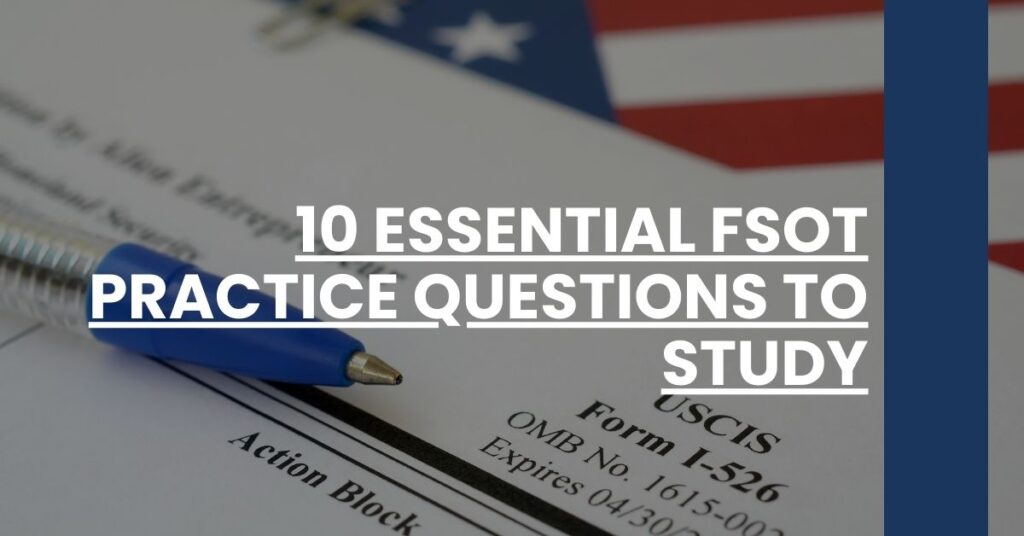

Ever wonder how you’d fare in the challenging world of diplomacy? Preparing for the Foreign Service Officer Test (FSOT) is no small feat, and your success hinges on practice.
This article is designed to walk you through the most effective fsot practice questions and strategies to ensure your preparedness isn’t left to chance. With our guidance, deciphering the nuances of the FSOT will seem far less daunting.
Table of ContentsEmbarking on your journey to master the Foreign Service Officer Test (FSOT) begins with a foundational understanding of what to expect on test day. Consider this your roadmap to navigating the multilayered terrain of the FSOT, which is designed not only to assess your knowledge but also to measure your potential for the critical and analytical rigors of a Foreign Service career.
The FSOT is structured into four distinct sections:
The insights from the comprehensive guide on how to approach the FSOT and an overview of the FSOT’s structure can prove indispensable as you tailor your study regimen to conquer each section with finesse.
Before you dive headfirst into fsot practice questions, ensure you meet the criteria to sit for the FSOT. The eligibility echelons are clear:
Understanding the details of these requirements is paramount, and resources such as the official FSOT FAQs provide clarity on nuances that may impact your application.
Securing your spot for the FSOT involves a straightforward registration process. Knowing when and how to register is vital to ensure you’re not side-tracked on your road to the Foreign Service:
Utilize resources provided by U.S. Embassies to familiarize yourself with the registration nuances and employ fsot practice questions to stay sharp as your examination date approaches.
When polishing your prowess in U.S. government and economics, focusing on key topics can sharpen your edge:
The DOSCareers mobile app can serve as a resourceful companion, offering a fountain of retired FSOT questions to test your knowledge in these areas.
Your understanding of world history and geography is also put under the microscope. This segment is not merely a test of memorized facts but an evaluation of your ability to connect historical dots and comprehend geographic contexts. Key focus areas include:
ProProfs and other online platforms offer practice questions that mirror the type of world history and geography queries you’ll face, while sources like Path to Foreign Service suggest the horizon of topics that the FSOT might cover, enabling you to gear your studies towards a holistic understanding of our world’s rich tapestry.
Writing a compelling essay under the pressure of the FSOT is an art form in itself. This is where your capacity to articulate your thoughts with precision and clarity is truly put to the test. Follow these strategies to ensure you’re well-prepared to make your argument stand out:
The FSOT Essay Simulator can be an exceptionally practical tool for crafting and refining essays that reflect the level of sophistication expected by the FSOT graders.
With a vast array of subjects to cover, the job knowledge segment of the FSOT can be intimidating. However, with a strategic approach, you can navigate through the thicket of fsot practice questions that span the spectrum of international affairs, history, culture, management, computers, economics, and more. Here are some targeted tips:
For a comprehensive array of topics, take advantage of the FSOT Sample Job Knowledge Test to self-evaluate your proficiency across different domains.
Your FSOT results can hinge heavily on how effectively you prepare. Integrating a routine and methodology to your study can transform a daunting syllabus into an achievable goal. Here’s how to do it:
Foundational resources like study plans and test-specific guidance from resources such as What Diplomats Do can be invaluable assets as you build your study strategy.
Simulated examinations, or mock tests, can be your secret weapon as you aim to conquer the FSOT. Incorporating these into your study routine can aid in:
Grasping the format of the test through practice exams can erase the unknown and replace it with familiarity, empowering you to walk in on test day with confidence.
Understanding how your efforts translate to scores gives you a sharper focus on what to prioritize within your preparation. Here’s what you need to keep in mind:
Arming yourself with knowledge on how the FSOT is graded can allow you to tailor your preparation to target those critical score-impacting areas.
Remember, your transition from student to diplomat begins with how well you marry studious preparation with strategic approach, epitomized by your engagement with fsot practice questions. No test can truly encapsulate your potential, but mastery of the FSOT is undoubtedly your first step on the diplomatic ladder.